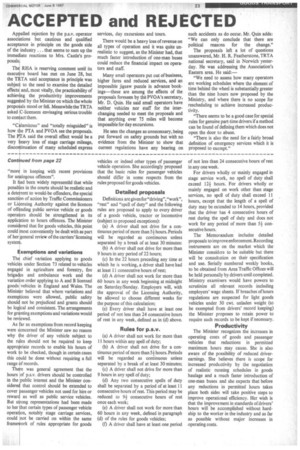ACCEPTED and REJECTED
Page 25

If you've noticed an error in this article please click here to report it so we can fix it.
Appalled rejection by the p.s.v. operator associations but cautious and qualified acceptance in principle on the goods side of the industry. .. that seems to sum up the immediate reactions to Mrs. Castle's proposals.
The RHA is reserving comment until its executive board has met on June 28, but the TRTA said acceptance in principle was subject to the need to examine the detailed effects and, most vitally, the practicability of achieving the productivity improvements suggested by the Minister on which the whole proposals stood or fell. Meanwhile the TRTA asked C-licensees envisaging serious trouble to contact them.
"Calamitous" and "totally misguided" is how the PTA and PV0A see the proposals. The PTA said the overall effect would be a very heavy loss of stage carriage mileage, discontinuation of many scheduled express services, day excursions and tours.
There would be a heavy loss of revenue on all types of operation and it was quite unrealistic to suggest, as the Minister had, that much faster introduction of one-man buses could reduce the financial impact on operators and staff.
Many small operators put out of business, higher fares and reduced services, and an impossible jigsaw puzzle in advance bookings—these are among the effects of the proposals foreseen by alb PV0A's secretary, Mr. D. Quin. He said small operators have neither vehicles nor staff for the interchanging needed to meet the proposals and that anything over 75 miles will become impossible for day excursions.
He sees the changes as unnecessary, being put forward on safety grounds but with no evidence from the Minister to show that current regulations have any bearing on such accidents as do occur. Mr. Quin adds: "We can only conclude that there are political reasons for the change."
The proposals left a lot of questions unanswered, Mr. H. R. Featherstone, TRTA national secretary, said in Norwich yesterday. He was addressing the Association's Eastern area. He said:—
"We need to assess how many operators are working schedules where the element of time behind the wheel is substantially greater than the nine hours now proposed by the Ministry, and where there is no scope for rescheduling to achieve increased productivity.
"There seems to be a good case for special rules for genuine part-time drivers if a method can be found of defining them which does not open the door to abuse.
"There is also the need for a fairly broad definition of emergency services which it is proposed to exempt."




























































































































